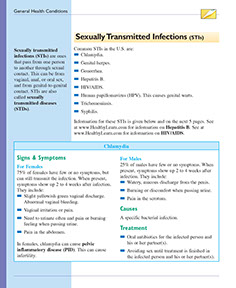CONDITIONS
SYMPTOM CHECKER
Male
Female
Child
Arm, Hand & Shoulder Concerns
Legs & Feet Concerns
Dental & Mouth Concerns
Ear & Nose
Eye Conditions
Head Conditions
Arm, Hand & Shoulder Concerns
Legs & Feet Concerns
Front
Back
Arm, Hand & Shoulder Concerns
Dental & Mouth Concerns
Ear & Nose
Eye Conditions
Head Conditions
Arm, Hand & Shoulder Concerns
Dental & Mouth Concerns
Ear & Nose
Eye Conditions
Head Conditions
Front
Back
Arm, Hand & Shoulder Concerns
Neck Links
Head & Neck Concerns
Arm, Hand & Shoulder Concerns
Neck Links
Head & Neck Concerns
Front
Back
Online Clinic
Wise Healthcare
Trichomoniasis
Print on Demand
RELATED ARTICLES
Sexually transmitted infections (STIs) are ones that pass from one person to another through sexual contact. This can be from vaginal, anal, or oral sex, and from genital-to-genital contact. STIs are also called sexually transmitted diseases (STDs).
Sexual Concerns
Signs & Symptoms
For Females
Symptoms may not be present for years. If they do occur, symptoms include:
• Vaginal itching and burning.
• A yellow-green or gray vaginal discharge with an odor.
• Burning or pain when passing urine.
• Pain during sex.
For Males
Symptoms are not usually present. Males can infect their sexual partners and not know it. When present, symptoms in males include:
Genital Herpes
Causes
Treatment
Resources
American Social Health Association (ASHA)
CDC National STD Hotline
800.CDC.INFO (232.4636)
Questions to Ask
Question 1
Do you have signs and symptoms of any of STIs?
You should be seen by your doctor for medical advice. Contact your doctor or health care provider to find out how soon you should be seen.
Question 2
Do you already have a diagnosis of genital herpes and do you have severe pain and blistering and/or are you having outbreaks often?
You should be seen by your doctor for medical advice. Contact your doctor or health care provider to find out how soon you should be seen.
Question 3
Are you symptom-free, but worried that you got an STI from someone you think may have one?
You should be seen by your doctor for medical advice. Contact your doctor or health care provider to find out how soon you should be seen.
Question 4
Do you want to rule out an STI because you have had many sex partners and you are starting a new sexual relationship or are planning to get married or pregnant?
You should be seen by your doctor for medical advice. Contact your doctor or health care provider to find out how soon you should be seen.
Question 5
Do sores appear in the genital area only after taking a recently prescribed medicine?
You should be seen by your doctor for medical advice. Contact your doctor or health care provider to find out how soon you should be seen.
Use Self-Care / Prevention:
You can probably take care of the problem yourself if you answered NO to all the questions. Use the “Self-Care” measures that are listed. Call your doctor if you don’t feel better soon, though. You may have some other problem.
Self-Care / Prevention
Safer Sex To Help Prevent STIs
• The only sure way to avoid STIs is not having sex. This includes intercourse, oral sex, anal sex, and genital-to-genital contact. Caressing, hugging, dry kissing, and masturbation are no risk or extremely low-risk practices. So is limiting your sexual contact to one person your entire life. This is if your partner does not have an STI and has sex only with you.
• Latex and polyurethane condoms can help reduce the risk of spreading HIV and other STIs (i.e., chlamydia, gonorrhea, and trichomoniasis). To do this, they must be used the right way for every sex act. They do not get rid of the risk entirely. Barriers made of natural membranes, such as from lamb, do not give good protection against STIs.
• Females and males should use latex or polyurethane condoms every time they have genital-to-genital contact and/or oral sex. Use polyurethane condoms if either partner is allergic to latex. You don’t need condoms to prevent STIs if you have sex only with one partner and neither of you has an STI.
• For oral-vaginal sex and oral-anal sex, use latex dams (“doilies”). These are latex squares.
• Latex condoms with spermicides, such as nonoxynol-9 (N–9) are no better than other lubricated condoms for preventing HIV/STIs. Spermicides with N–9 do not prevent chlamydia, cervical gonorrhea, or HIV. on’t use spermicides alone to prevent HIV/STIs. Using spermicides with N–9 often has been linked with genital lesions which may increase the risk of spreading HIV. Also, N–9 may increase the risk of spreading HIV during anal intercourse.
• Use water-based lubricants, such as K-Y Brand Jelly. Don’t use oil-based or “petroleum” ones, such as Vaseline. They can damage latex barriers.
• To lower your risk for HPV, use latex or polyurethane condoms. These work best at covering areas of the body that HPV is most likely to affect. A diaphragm does not prevent the spread of HPV.
• Don’t have sex while under the influence of drugs or alcohol. You are less likely to use “safer sex” measures.
• Limit sexual partners. Sexual contact with many persons increases the risk for STIs, especially if no protection is used.
• Discuss a new partner’s sexual history with him or her before you start having sex. Know that persons are not always honest about their sexual past.
• Avoid sexual contact with persons whose health status and health practices are not known.
• Follow your doctor’s advice to check for STIs.
For Trichomoniasis
Don’t drink alcohol for 24 hours before, during, and 24 hours after taking metronidazole. The combination causes vomiting, dizziness, and headaches.
This website is not meant to substitute for expert medical advice or treatment. Follow your doctor’s or health care provider’s advice if it differs from what is given in this guide.
The American Institute for Preventive Medicine (AIPM) is not responsible for the availability or content of external sites, nor does AIPM endorse them. Also, it is the responsibility of the user to examine the copyright and licensing restrictions of external pages and to secure all necessary permission.
The content on this website is proprietary. You may not modify, copy, reproduce, republish, upload, post, transmit, or distribute, in any manner, the material on the website without the written permission of AIPM.
2021 © American Institute for Preventive Medicine - All Rights Reserved. Disclaimer | www.HealthyLife.com
















































